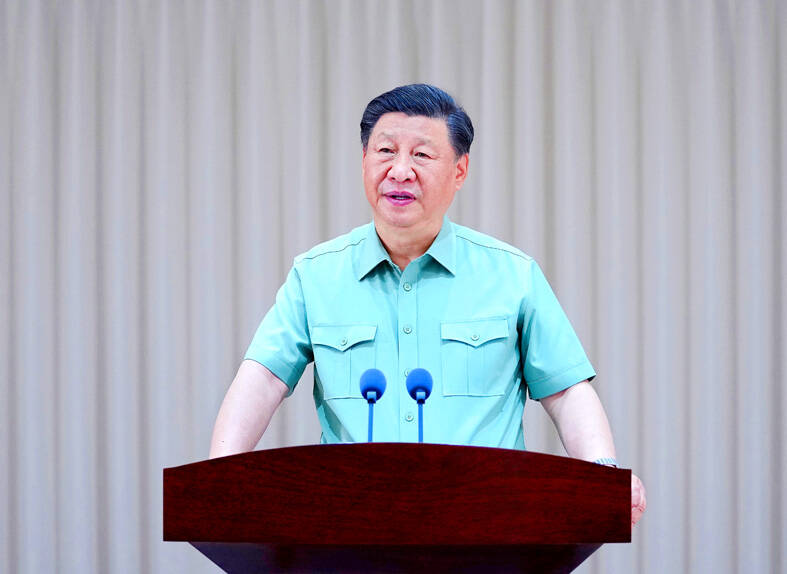The Wagner Group revolt highlighted the fragility of dictatorship and it might deepen Chinese President Xi Jinping’s (習近平) insecurity, National Security Council Secretary-General Wellington Koo (顧立雄) said.
Wagner Group mercenaries seized the Russian army base in Rostov-on-Don and advanced toward Moscow with the aim of toppling Russian President Vladimir Putin last month.
“Dictatorship might not be as strong as we thought and its fragility still exists,” Koo said in an interview with the Chinese-language Liberty Times (the sister paper of the Taipei Times) posted online yesterday.

Photo: EPA-EFE / Xinhua / Li Gang
Xi prioritizes the security of his authority over everything else, Koo said, adding that it remains to be seen how the anxiety caused by anti-espionage legislation and the languid economy turns out.
Koo said that China intends to seek unification with Taiwan by any means and considers it a “historic mission,” while 90 percent of Taiwanese wish to maintain the “status quo.”
The conflicting objectives are the fundamental source of the tensions across the Taiwan Strait, rather than the Democratic Progressive Party being in office, he said.
Even if the candidate of the Chinese Nationalist Party (KMT) or another party won the presidential election, they would face the same situation, he added.
The US takes the approach of coordinated deterrence on China, such as by issuing statements on international occasions to underline the importance of cross-strait peace and stability as it concerns the interests of the world, Koo said.
The US and its international allies are sending a clear and consistent message to China against unilaterally changing the “status quo” by force, he said.
The US is planning to form a Marine Littoral Regiment and has access to military bases in the Philippines to prevent China from easily entering and exiting the first island chain, he added.
In addition to Washington’s efforts, Taiwan has to strengthen its self-defense capabilities, Koo said.
China, should it invade, would be at risk of economic sanctions and the intervention of foreign military forces, he said.
If Xi is rational, he would understand that invading Taiwan by force would lead to consequences that he cannot afford, he added.
Cross-strait issues are not Chinese domestic issues, but a concern of the international community, Koo said.
The UN Charter stipulates that international disputes should be resolved peacefully and the G7 is “strongly opposing any unilateral attempts to change the peacefully established status of territories by force or coercion anywhere in the world,” he said.
Taiwan and China not being subordinate to each other has become a reality “acknowledged to a great extent by the international community,” he added.

SHIPS, TRAINS AND AUTOMOBILES: The ministry has announced changes to varied transportation industries taking effect soon, with a number of effects for passengers Beginning next month, the post office is canceling signature upon delivery and written inquiry services for international registered small packets in accordance with the new policy of the Universal Postal Union, the Ministry of Transportation and Communications said yesterday. The new policy does not apply to packets that are to be delivered to China, the ministry said. Senders of international registered small packets would receive a NT$10 rebate on postage if the packets are sent from Jan. 1 to March 31, it added. The ministry said that three other policies are also scheduled to take effect next month. International cruise ship operators

NUMBERS IMBALANCE: More than 4 million Taiwanese have visited China this year, while only about half a million Chinese have visited here Beijing has yet to respond to Taiwan’s requests for negotiation over matters related to the recovery of cross-strait tourism, the Tourism Administration said yesterday. Taiwan’s tourism authority issued the statement after Chinese-language daily the China Times reported yesterday that the government’s policy of banning group tours to China does not stop Taiwanese from visiting the country. As of October, more than 4.2 million had traveled to China this year, exceeding last year. Beijing estimated the number of Taiwanese tourists in China could reach 4.5 million this year. By contrast, only 500,000 Chinese tourists are expected in Taiwan, the report said. The report

HORROR STORIES: One victim recounted not realizing they had been stabbed and seeing people bleeding, while another recalled breaking down in tears after fleeing A man on Friday died after he tried to fight the knife-wielding suspect who went on a stabbing spree near two of Taipei’s busiest metro stations, Taipei Mayor Chiang Wan-an (蔣萬安) said. The 57-year-old man, identified by his family name, Yu (余), encountered the suspect at Exit M7 of Taipei Main Station and immediately tried to stop him, but was fatally wounded and later died, Chiang said, calling the incident “heartbreaking.” Yu’s family would receive at least NT$5 million (US$158,584) in compensation through the Taipei Rapid Transit Corp’s (TRTC) insurance coverage, he said after convening an emergency security response meeting yesterday morning. National

The Forestry and Nature Conservation Agency yesterday launched a gift box to market honey “certified by a Formosan black bear” in appreciation of a beekeeper’s amicable interaction with a honey-thieving bear. Beekeeper Chih Ming-chen (池明鎮) in January inspected his bee farm in Hualien County’s Jhuosi Township (卓溪) and found that more than 20 beehives had been destroyed and many hives were eaten, with bear droppings and paw prints near the destroyed hives, the agency said. Chih returned to the farm to move the remaining beehives away that evening when he encountered a Formosan black bear only 20m away, the agency said. The bear